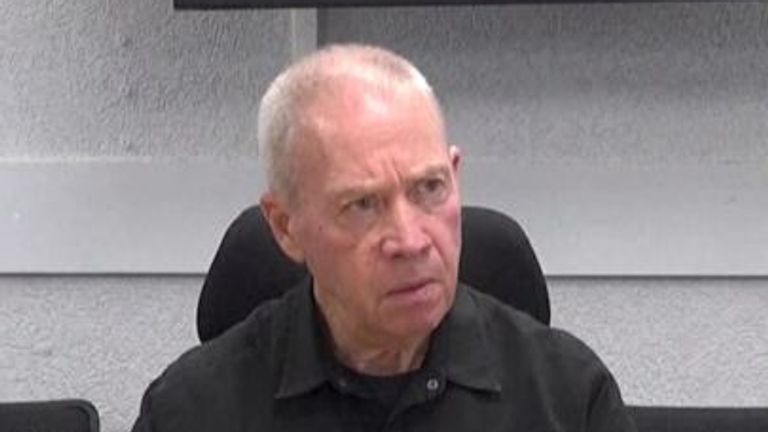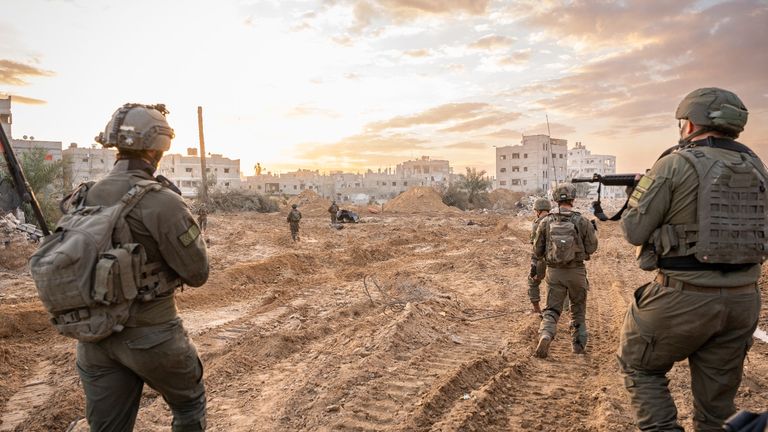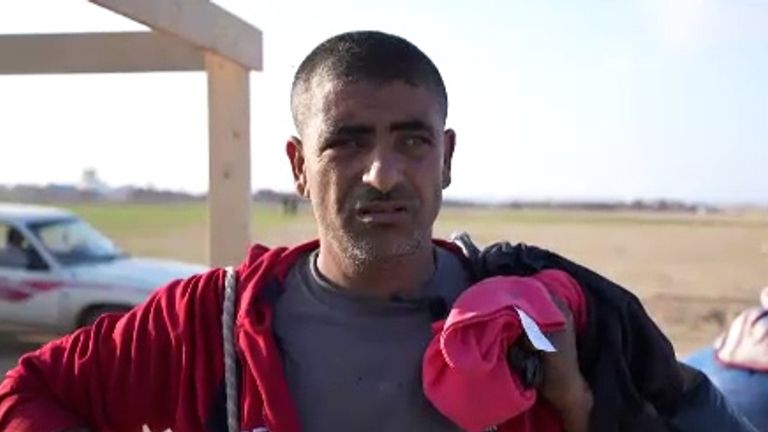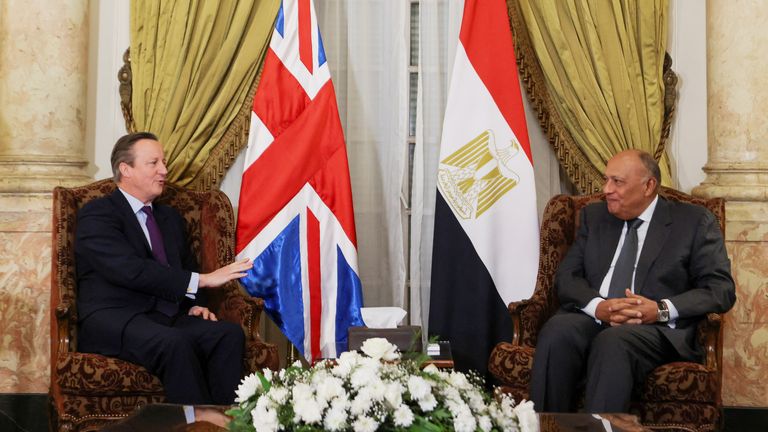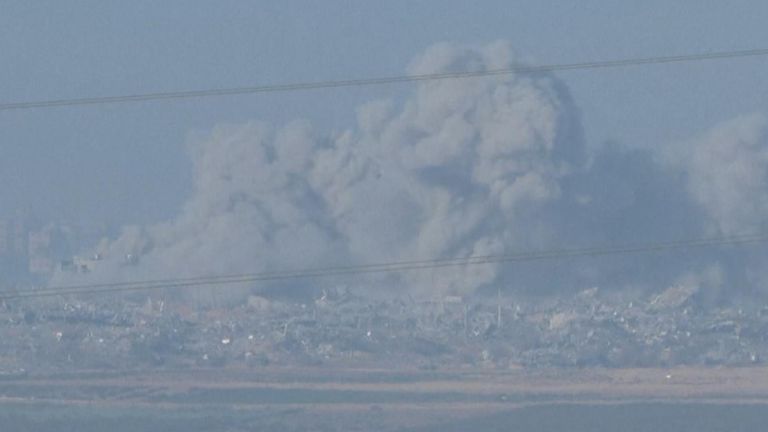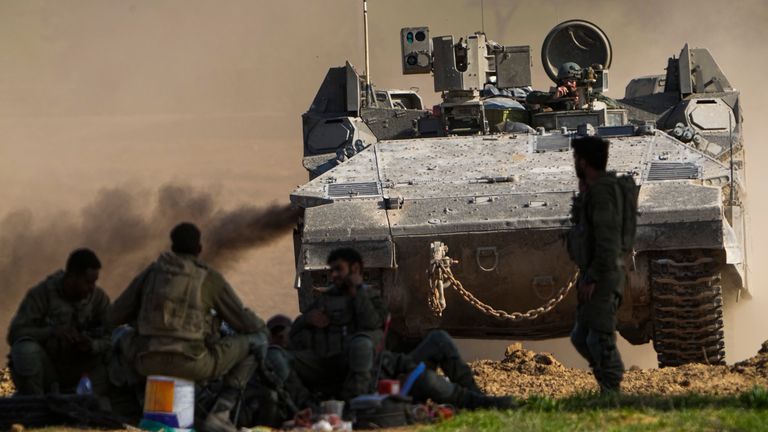Israel’s government is divided over what to do about Gaza once the war is over and the latest plan by the country’s defence minister, Yoav Gallant, has only intensified the debate.
Gallant’s plan is not the official Israeli government position – yet. It must be debated by the war and security cabinets first.
It calls for Palestinians to govern themselves after the war, but it makes no mention of who would do it.
Follow live:
Israel-Hamas war latest
The plan doesn’t refer to a role for the Palestinian Authority (PA) – which currently has limited control in the West Bank – or for a bureaucracy of experts, academics, and members of civil society to step in.
The US has said previously that it supports a role for a revamped PA to govern Gaza, but the PA has pushed back and says it doesn’t want to “ride into Gaza on the back of an Israeli tank”.
Israel’s Prime Minister, Benjamin Netanyahu, has argued he’s not in favour of having the PA control both the West Bank and Gaza.
Having a unified Palestinian national movement governing both occupied territories would make it far more difficult for Israel to argue it has “no partner in peace”, and that the Palestinian political house is too divided to launch meaningful negotiations for a two-state solution.
Gallant’s position is that there will be no role for Hamas in the post-war governance of the strip and that the militant group will be defeated in this war.
Unclear what maintaining ‘security’ will involve
Gallant calls for Israel to maintain security control of the Gaza Strip post-war. Netanyahu has said the same thing.
But it’s unclear what this would mean for the 2.3 million people who live in the devastated enclave.
It could mean the Israeli military continues to have operational control of Gaza and conducts raids, incursions, targeted attacks from drones and F16s, and the assassination of Hamas and Islamic Jihad military leaders, at will.
The Israeli Defence Forces (IDF) has always attacked Gaza when it wanted to, arguing strikes and incursions were necessary for “security reasons”.
The difference now is that any Israeli ground incursions will likely be deep within the territory.
The plan doesn’t mention a permanent Israeli military presence, nor does it say there won’t be one.
Yoav Gallant says the IDF should shift to the third phase of the war, replacing aerial bombardment with attacks on specific targets and key figures.
However, Palestinians have been waiting for this change for the last couple of weeks.
They say Gaza is still being bombed from the air, including areas that were meant to be safe, like Rafah and al-Muwasi.
Gazans don’t want to endure a third phase of the war – they want a permanent ceasefire.
Read more:
Hamas blames Israel for ‘cowardly assassination’
Israel on high alert for attacks from Lebanon
Analysis: Blinken heads to Middle East in firefight mode
What is Egypt’s role?
Under the Israeli defence minister’s plan, Egypt will be a “major actor” in the future of Gaza.
Qatar took the lead role in negotiating the first temporary truce and hostage deal, and since then Egypt has resumed its traditional role as the key player.
Egypt put forward its own four-phase plan to end the war, with a series of short-term ceasefires and prisoner-hostage exchanges, which would lead to a permanent truce.
However, Israel won’t agree to any plan that allows Hamas to remain in Gaza, and Hamas won’t sign up to any deal where it is not part of the final equation.
Calls for a multinational force
Eventually, Gaza will need to be rebuilt. Israel’s aerial bombardment has devastated the strip’s infrastructure.
Gallant proposes an international force of European and Arab countries to rebuild the Gaza Strip.
But wealthy Gulf Arab nations like Qatar and Saudi Arabia have thrown money at Gaza before, only to have it destroyed – rebuilt – and destroyed again.
These countries will want a guarantee that the Israeli military won’t go to war there again.
Border control and settlers debate
Gaza will remain under siege. There is no way Israel will give up its full control of Gaza’s border, airspace or sea after this war.
Gallant did not advocate for the return of Israeli settlers to Gaza, as has been pushed for by some of the government’s far-right ministers.
Bezalel Smotrich, Israel’s finance minister, has renewed a call for settlers to be sent back in. Israel pulled them out in 2005.
Mr Smotrich has criticised Gallant’s plan as a “re-run of the day before 7 October” and has called for “out-of-the-box thinking”.
Inside Gaza, people are still suffering
While Egypt, Israel and the US talk about what is next for Gaza, Palestinians say it’s a distraction from the actual war.
Gaza’s health officials say around 100 people are being killed every day.
More than one million people are displaced in the southern city of Rafah, almost all of them are living in tents, and winter has arrived.
There is still barely any aid entering Gaza – around 100 trucks per day – not enough to feed the two million people across the strip who are displaced.
Aid agencies say no aid is reaching the northern end of the enclave, where tens of thousands of people are living in the ruins of their homes.



